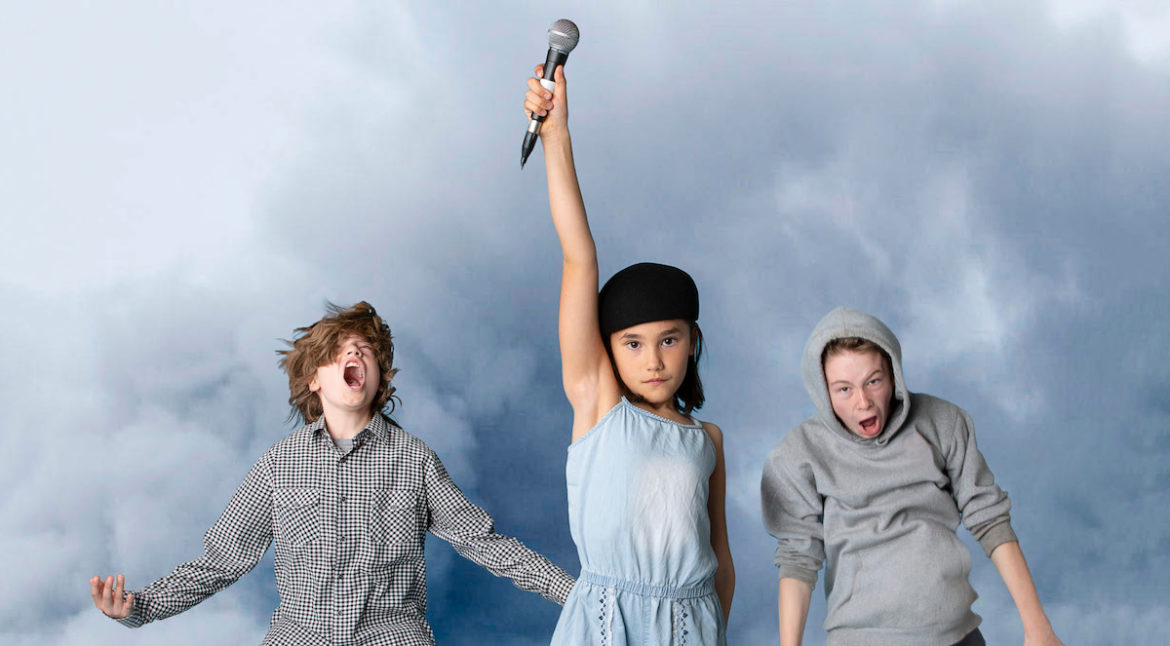‘This is not a show: it’s a wake-up call.’ Youth critic Gully Thompson on Born in a Taxi’s Children of the Evolution
I’m very passionate about the voice of the child (casually tips hat at Greta Thunberg). It’s an element that for me always empowers children’s theatre, opening it up for both younger audiences and their adult counterparts. And this is where Children of the Evolution hits home. Its vigour and strength is about projecting and empowering the child’s voice.
Children of the Evolution is not conventional theatre. It’s an experiment, which makes it unique and fresh, and genuinely interesting. Directed by Jackson Castiglione and created by Born in a Taxi, the work is structured like a cross between a talk show and a classroom.
The five main performers – all between the ages of 9 and 13 – are surrounded by two circles of chairs: the inner for children, the outer for adults. The children introduce themselves, then question the audience, canvassing a wide variety of topics. They range from “What’s the weirdest thing you’ve ever eaten?” to “Why do you think women and men should be equal?” The performers don’t hold back: they don’t sugar-coat these topics, but tackle them head on.
It’s interesting to see how the weight of this show shifts between the performers and the audience. The show combines a mixture of scripted monologues and improvisation. The audience is given the job of answering these questions, and it’s soon apparent that it’s no easy task. Just as the performers are completely improvisational, the audience has to generate answers on the fly. It’s interesting to see how enthusiastic some of the kids are to take on this challenge, while many adults in the audience shy away.
This improvised feel heightens the rawness of the performers’ voices, which is to me the most important aspect of the show. In a way, this performance has two different impacts, depending on whether you’re a child or an adult. A child is affected by this show not just for laughs or the fun of it, but because there is a strong educational value how these topics are presented. These children teach us that we shouldn’t be afraid to speak up.
The weight the show puts on the audience both has its upsides and problems. The pressure on audience members is enormous, affecting the quality of their answers. There were many excellent answers from the younger audience members, but I suspect many of the adults, and some of the children too, were not prepared to take it on: there were quite a few “I don’t knows”, and kids dodging away from the microphone.
As a consequence, it feels that some topics aren’t explored to their full potential. The show is very loose, as if there are gaps that need to be filled by the audience’s contribution. It’s interesting how the show both needs to put less and more pressure on the audience: too much pressure results in loose answers. On the other hand, the core idea in the show is the uprising of children, their evolution. The children need to put pressure on the adults, directly pointing out the oppression that adults are inflicting on children currently in society. The show does address this – but it needs just a smidge of Greta Thunberg power to push it to its maximum capacity. (We do, of course, get this power right at the end, with a snippet of her voice.)
The structure is a bit of a paradox. As I mentioned, some bits of the show are scripted while others are improvised. In the end, the improvised parts have the most effect. This is because they are natural, untouched and raw examples of a child’s voice and power. It is truly what this show is about and must hold dearly: the power of the child’s voice, and the uprising it signals.
As a result, when the show enters scripted territory, which is mostly jokes for the benefit of the younger audience, it halts this quality in its tracks. It doesn’t remove the impact of their voices, so much as stop its flow. In this sense, it needs less structure, although less structure comes at the price of weaker answers from the audience.
The courage of this experiment is truly admirable. The five young performers are amazing: they speak passionately about their chosen topics, from racism, to how the schooling system affects one of the performer’s dyslexia, from life and death to feminism, to how our species is devolving and losing intelligence. The audience is clearly captivated, and you can see the power of the child’s voice begin to resonate within them.
At its heart, Children of the Evolution is an experiment meant to present the power of the child’s voice to the adults who ignore it. It teaches the new generations that there is nothing to fear in speaking about these topics, and that in order to move forwards as a society we must become a collective that has the capability to discuss difficult things. And these young people have this power. They have the voice: what they need now is more projection.
Because this is not a show: it’s a wake-up call. The children are rising.
And they’re evolving fast.
Children of the Evolution, co-created with director Jackson Castiglione, Flynn Murphy, Mani Bishop, Lola McCann, Zara Nawaz, Sunday Orchard Livingston, Penny Baron and Carolyn Hanna. Born in a Taxi at Footscray Community Arts Centre as part of Due West Arts Festival. Until November 24. Bookings
Wheelchair accessible

